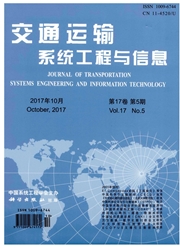

 中文摘要:
中文摘要:
从个体出行方式选择决策机理入手,以演化博弈理论为基础,基于出行链构建了考虑回程因素的闭环通勤出行选择决策模型.模型中考虑了个体对去程与回程两次出行感知程度的两类影响因素,模拟了回程过程的3种不同情境,研究回程加入不同活动情境下对整个闭合通勤链出行选择决策的影响,并将考虑回程因素的决策结果与仅考虑单次出行的结果进行对比,证明了考虑回程因素的必要性.最后,以北京市典型通勤OD为例,对模型进行实证分析.结果表明,仅考虑去程时,小汽车方式优势凸显;而考虑回程因素时,回程过程中加入的不同活动将影响个体闭环出行链出行选择决策结果,小汽车将不再成为人们出行的最优选择,定制公交的优势不容小视.
 英文摘要:
英文摘要:
Analyzing the mechanism of travel mode choice of commuters,a new model to study the travel mode choice behavior based on the demand of closed trip chain is carried out.In this model,the influence factors of commuters’ perceptions of go and return trips are considered.Meanwhile,three different situations of the return trips are simulated and the effects of activities in the return trips on travel mode choice behavior of private car owners in commuters’ closed trip-chain are researched,and then the results of the decisions considering the return trips are compared with the results of single trip.The probabilities of the travel mode choice are gotten through the evolutionary game theory.Finally,it made an empirical analysis based on the typical OD of commuters in Beijing.The results show that if only half of the closed trip chain is considered,the car becomes the best choice and it has great advantage,and if the whole closed trip chain is considered,the results are different under different situations and the car may not be the best choice,and the advantages of the customized shuttle buses cannot be overlooked.
 同期刊论文项目
同期刊论文项目
 同项目期刊论文
同项目期刊论文
 期刊信息
期刊信息
